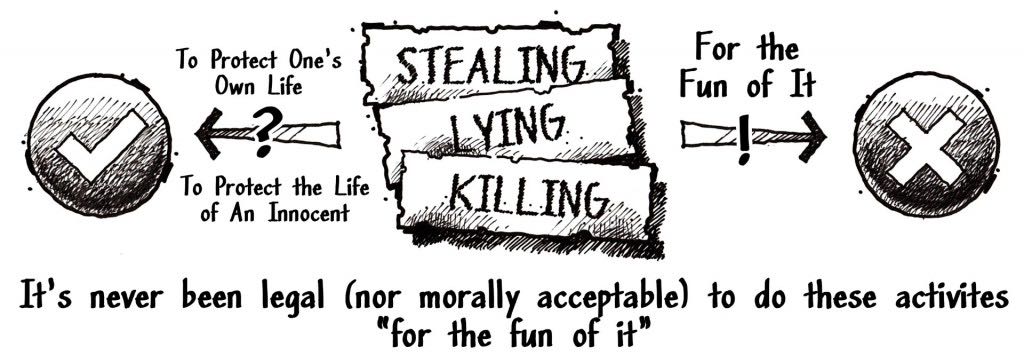
There are many similar transcendent, objective moral truths, even though groups often try to justify their seemingly immoral behaviors. In California, for example, there are several legal justifications for homicide. Police officers can use whatever force necessary—including deadly force—to overcome lethal resistance or to apprehend certain kinds of felons. Citizens can use whatever force is necessary—including deadly force—to stop a life-threatening attack or to protect the life of an innocent person. These are considered justified homicides (as opposed to unjustified homicides known as “murders”).
But it’s never been legal (nor morally acceptable) to kill someone for the fun of it. In fact, if you simply add the clarifying condition “for the fun of it” to any questionable moral behavior, you’ll discover yet another transcendent, objective moral principle: it’s never morally acceptable to lie for the fun of it, to cheat for the fun of it, or to steal for the fun of it. While you might offer some appropriate defense for engaging in these behaviors, their justification will require more than your personal enjoyment. Humans throughout history have recognized the universal, transcendent, objective nature of a variety of moral codes, even though some behaviors can be defended under certain circumstances.

Illustration from God’s Crime Scene
In a similar way, there are a number of transcendent, objective moral virtues accepted by humans throughout history, even though these are also sometimes nuanced by circumstances. As Oxford scholar C. S. Lewis said, “Men have differed as regards what people you ought to be unselfish to—whether it was only your own family, or your fellow countrymen, or everyone. But they have always agreed that you ought not to put yourself first. Selfishness has never been admired.”
But how are we to account for the objective, transcendent moral truths we recognize in our universe? In my book, God’s Crime Scene, I ask the simple question we ask at every potential crime scene: “Can all the evidence we see ‘inside the room’ be explained from ‘inside the room’?” if we apply this question to the existence of objective moral truth, we must ask, “Can we explain the existence of objective moral truth ‘inside the room’ of the natural universe by staying ‘inside the room’ for an answer?”
Some naturalistic philosophers, in an effort to explain moral truth from “inside the room” of the universe, believe all moral truth is subjective rather than objective. In other words, subjects (people) are the ultimate source of what is “right” or “wrong.” According to this view, termed “moral subjectivism,” morality varies from person to person. Moral beliefs are based primarily on our subjective feelings, and because these attitudes are specific to each of us individually, they cannot be fairly assumed in others; they are simply personal opinions.
In addition, people often disagree about the moral status of a particular action or situation, and these disagreements are often irreconcilable. Moral subjectivists offer this as yet another reason to reject the existence of objective moral truth. While this does explain morality from “inside the room” of the universe (rooted in the individuals who live here), it lacks explanatory power:
This Approach Overestimates the Value of Feelings
The cause of a belief doesn’t always have much to do with whether or not the belief is true. There are often times when I call an arrestee’s mother to notify her of her son’s arrest. Some moms in this situation refuse to believe their kids could do anything wrong. Many even try to justify their son’s behavior and reject the “wrongness” of his actions. When my arrestee’s mothers refuse to see anything wrong with their sons’ behavior, do these maternal feelings preclude us from making a decision about whether or not their sons committed an immoral act? No. Feelings may follow from moral realities but we have to be careful not to allow feelings to dictate moral realities.
This Approach Eliminates Moral Debate
If moral subjectivism is true, people who disagree about the moral status of an act (as my arrestee’s moms and I might disagree), would be unable to argue for the rightness of their position. If these moms and I are the final individual determiners of what is right or wrong, none of us could appeal to anything higher than our own opinion to settle a moral disagreement. How could I think my position related to any crime was superior to the mothers of my arrestees? All of us would be grounding our moral decisions in the same level of authority: our personal authority. If morality is subjective, no one has the right to say he or she is morally correct or someone else is morally incorrect.
This Approach Leads to Moral Selfishness
If individuals are the source of all moral truth, what stops us from simply pursuing our own self-interests? In fact, ethical “egoists” believe each of us has a moral duty to advance what’s in one’s own long-term best interest. As a cold-case homicide detective, I can certainly testify to the selfishness I’ve seen in the humans I’ve arrested over the years. But I’m not the only one to observe this. Evolutionary biologist George Williams has chronicled the selfish behavior represented throughout the animal kingdom. If moral truth is rooted in the beliefs and opinions of subjects, why should anyone care about anyone other than himself or his own family or tribe?
Moral subjectivism leads to a worldview in which such altruism makes little or no moral sense. If this kind of subjectivism is true, we live in a “dog eat dog,” “survival of the fittest” world. Selfless duty makes little or no sense in such a world. Why should I, as a police officer, risk my life and the future of my family to help others? As philosopher Louis Pojman once wrote, “Subjectivism treats individuals like billiard balls on a societal pool table where they meet only in radical collisions, each aimed at his or her own goal and striving to do in the others before they themselves are done in.”
Moral subjectivism leads to a worldview in which such altruism makes little or no moral sense. If this kind of subjectivism is true, we live in a 'dog eat dog,' 'survival of the fittest' world. Selfless duty makes little or no sense… Share on XMoral subjectivism simply cannot explain the existence of objective, transcendent moral truths. Worse yet, these kinds of moral truths are not mere brute facts about the universe, they’re not a product of culture, and they’re not a result of human biology or evolution. The best explanation for these kinds of moral truths (and obligations) is the existence of a transcendent, objective, personal moral law giver. This short blog is an excerpt from God’s Crime Scene. For more information and detail related to this topic, refer to Chapter Seven – Law and Order: Is Morality More Than An Opinion?

J. Warner Wallace is a Dateline featured Cold-Case Detective, Senior Fellow at the Colson Center for Christian Worldview, Adj. Professor of Christian Apologetics at Talbot School of Theology, Biola University, author of Cold-Case Christianity, God’s Crime Scene, and Forensic Faith, and creator of the Case Makers Academy for kids.
Subscribe to J. Warner’s Daily Email
J. Warner Wallace is a Dateline featured cold-case homicide detective, popular national speaker and best-selling author. He continues to consult on cold-case investigations while serving as a Senior Fellow at the Colson Center for Christian Worldview. He is also an Adj. Professor of Christian Apologetics at Talbot School of Theology, Biola University, and a faculty member at Summit Ministries. He holds a BA in Design (from CSULB), an MA in Architecture (from UCLA), and an MA in Theological Studies (from Gateway Seminary).
































